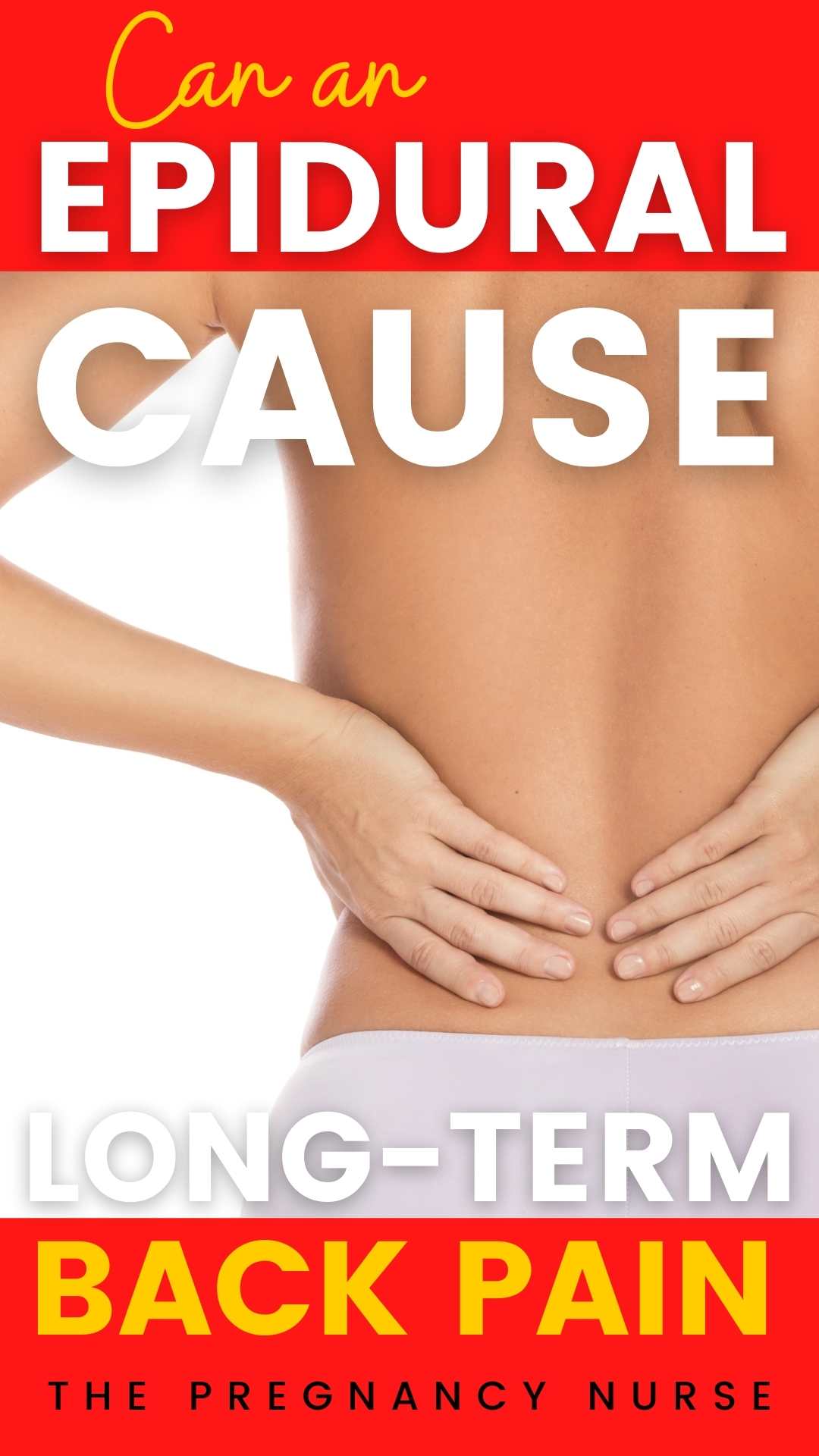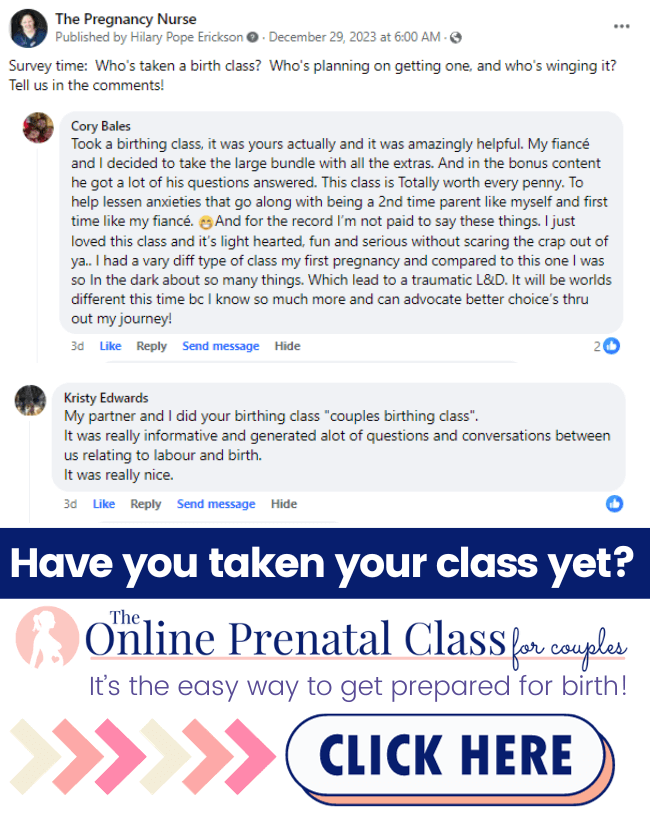There is a lot of discussion about whether or not epidurals cause back problems for pregnant women. Here we will explore the evidence to help you make an informed decision about whether or not to have an epidural during your labor.
But first, how do I know all of this? Hi — I’m Hilary — The Pregnancy Nurse 👩⚕️. I have been a nurse since 1997 and I have 20 years of OB nursing experience, I am also the curly head behind Pulling Curls and The Online Prenatal Class for Couples. 🩺 I have helped thousands of families get an epidural, as well as having 3 of my own. This is a BIG question among people considering anesthesia and I even have some studies to help back up my thoughts.
This is part of my Complete Guide to Epidurals — so if you have more questions don’t miss that!
What is an epidural and how does it work
An epidural is a regional anesthesia that numbs the area around your spinal cord. It is the most common form of pain relief during labor, and it works by blocking the nerves that carry pain signals from your uterus to your brain.
I have a TON of information on my website about epidurals, and labor pain management in general.
It is important to remember that they are putting a needle close/through some ligaments and tendons that you use while holding your body up. There may be bruising related to this, similar to how the IV feels after that is taken out.
If you are looking for more information about epidurals I STRONGLY suggest you take a hospital-based prenatal class. They will really explain the process to you so that you understand what to expect BEFORE getting to the hospital.
With great videos like this one:
How common are back problems after an epidural
There is no definitive answer, but a large-scale study in Lithuania found that there wasn’t a considerable difference between the back pain of women who had an epidural vs those who did not.
At most points in the study, a similar number of women who got an epidural vs natural or IV pain medication complained about back pain. Meaning MANY women experience low back pain after labor, and a similar number had epidurals as did NOT have an epidural.
It’s important to know that often epidurals are given FOR back pain — so, obviously those providers & patients are finding it worthwhile to have the injection for back pain (rather than it causing more).
So, what does the evidence say about whether or not an epidural can cause back problems
This study showed that there was an increased complaint of low back pain, but only in the first few days after delivery and then it evened-out with the Epidural groups vs the non-epidural groups.
The reality is that a LOT of new moms experience low back pain.
It can be from a variety of things:
- New body mechanics with the baby out
- Painful swollen uterus
- Cramping from uterus returning to its regular size
- How you hold the baby (especially with feedings)
- Carrying the carseat
- New body mechanics with baby care practices (changing diapers, bathing, etc).
- Overall they feel worse because they are SO tired.
It’s important to consider the alternative. Childbirth is a physically demanding process, and without an epidural, you would be relying on your body’s natural pain relief mechanisms. These mechanisms are not always effective, and they can result in a prolonged and more difficult labor. For some women, the risks associated with an epidural are worth it for the pain relief they provide.
What did I feel after my epidurals?
I would have some pain when the water in the shower would run on that spot — similar to any bruise. But with time it resolved (just like a bruise) and I was fine. I never felt “deep” back issues, but I did feel tired and my back hurt as a new mom. Again, likely because of the things I mentioned above.
What can you do to prevent back problems after an epidural
There are a few things you can do to minimize the risk of back problems after an epidural:
Choose an experienced anesthesia provider: Make sure you are working with an experienced and reputable anesthesia provider. That would likely be up to the hospital you are delivering at. If, at any point, you feel like they are not up to the task you can always ask them to stop and possibly use a different provider.
Follow their instructions: Follow your anesthesia provider’s instructions for position changes and moving around during labor.
Get up and move around: Once you are feeling better, get up and move around as soon as possible. This will help prevent stiffness and improve your circulation.
Postpartum Stretching: While strenuous exercise is not encouraged, you should still stretch your body — especially your back to make sure that it’s not getting stiff.
Are there any other risks associated with epidurals
There are a few other rare risks associated with epidurals, including:
Severe headache: A small percentage of women develop a severe headache after an epidural. This is caused by a leak in the dura, the membrane that surrounds the spinal cord. This is most often called a spinal headache.
Nerve damage: In very rare cases, an epidural can cause nerve damage.
Infection: There is a small risk of infection at the injection site, as with any time the skin is punctured.
As with any medical procedure, there are risks associated with epidurals. However, for most women, the benefits outweigh the risks. If you are considering an epidural, talk to your doctor or midwife about the risks and benefits to help you make an informed decision.
You can also ask to speak with anesthesia about the risks and benefits before asking for the procedure. Keep in mind that list may end with “death” as it is a possible end to driving our car, turning on the oven or just walking down the street.
Tips like that help make informed consent a bit easier to “swallow” — I give tons of tips like that in here.
What are the benefits of having an epidural during labor
For many women, the biggest benefit of having an epidural during labor is the pain relief it provides. Epidurals are very effective at numbing the area around your spinal cord, which can help you relax and get some rest during labor.
I have a whole post on the reasons to get an epidural.
I also have a whole post on reasons to NOT get an epidural — to keep it fair and balanced. 🙂
How do you know if you need an epidural during labor
There is no one answer to this question. Every woman’s experience of labor is different, and what works for one woman may not work for another. However, if you feel like you want an epidural you should feel free to request one.
If you are considering an epidural, talk to your doctor or midwife about your options. They will be able to help you weigh the risks and benefits to decide if
What is the bottom line about epidurals and back pain
The bottom line is that epidurals are a safe and effective way to relieve pain during labor. For most women, the risks associated with an epidural are outweighed by the benefits.
Make sure you understand the risks and benefit before getting an epidural. Make sure ALL your questions are answered and you feel comfortable before getting it as anesthesia. The anesthesiologist may try to rush you (they are busy people) but, there’s no need. Take your time before making the choice.
If you want more information on pain management, or talking with your healthcare team, we cover all of that (and more) in The Online Prenatal Class for Couples. It starts at just $35 and it takes just a few hours of your time to help you feel more prepared and confident about your birth!
Want to do a vibe check before diving into the whole thing with me? — check out my free labor pro tips. It’s your first step toward getting in the driver’s seat of your birth.







 The Benefits of a Midwife
The Benefits of a Midwife
